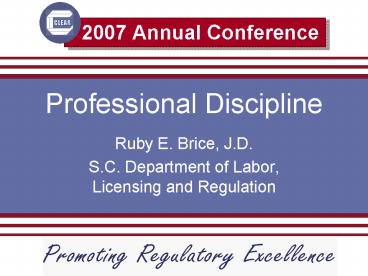Professional Discipline - PowerPoint PPT Presentation
1 / 22
Title:
Professional Discipline
Description:
S.C. Department of Labor, Licensing and Regulation ... Cease and Desist. Restitution. Council on Licensure, Enforcement and Regulation. Atlanta, Georgia ... – PowerPoint PPT presentation
Number of Views:171
Avg rating:3.0/5.0
Title: Professional Discipline
1
Professional Discipline
2007 Annual Conference
- Ruby E. Brice, J.D.
- S.C. Department of Labor, Licensing and Regulation
2
The Disciplinary Process
- Use of Administrative Hearings
- Nature of Proceeding
- Role of the Board
- Participants
- Jurisdiction of the Board
3
Steps in a Disciplinary Action
- Initial Complaint
- Investigation
- Formal Complaint
- Informal Disposition
- Formal Hearing
- Sanction
- Judicial Review
4
Steps in the Enforcement Process
- Intake Receiving and acknowledging complaints,
setting up files and initiating complaint
tracking. - Assessment Screening complaints determining
the type of response appropriate for the
complaint determining jurisdiction. In cases of
perceived immediate public risk statute may
permit immediate suspension of registration. - Investigation Assigning an investigator or
investigative teams for determining the details
of the case and producing a final report.
5
Steps in the Enforcement Process
- Review Determining the disposition of
investigated complaints those without merit,
closed those with merit, a determination of the
level of action to be taken. - Formal and Informal Resolution Informal
resolution by stipulated agreement or Formal
Hearings formal resolution by hearings before
the board or administrative law judge. - Final Orders Determining facts, legal
conclusions and sanctions in appropriate cases. - Compliance Following up on all final orders to
assure the orders are being obeyed.
6
Practitioner Misconduct
- Misconducts may include but are not limited to
- Direct physical harm to a client
- Abuse of a client
- Improper advertising
- Failure to provide access to records
- Failure to keep records as required
7
Practitioner Misconduct
- Falsification of records
- Failure to maintain Standards of Practice
- Failure to comply with the Code of Conduct
- Falsifying financial records
- Practicing the profession while mentally
incompetent - Practicing the profession while impaired
8
Mental or Physical Impairment
- Appropriate mental and/or physical evaluations be
completed to ensure that the board has complete
information on which to base their decisions in
these cases.
9
Chemical Impairment
- The process of drug impairment in regulated
professionals typically progresses along a
continuum from use, to misuse, to abuse, to
dependency on a chemical substance. A regulatory
authority should be careful in determining if a
licensees drug activity is for legitimate
reasons, and not interfering with competent
performance.
10
Informal Disposition of Complaints
- Advantages of Informal Disposition
- Disposition by Correspondence
- Consent Order
- Settlement
- The Boards Role in Informal Dispositions
11
The Formal Hearing
- Format
- Hearing Officer
- Panel
- Full Board
- Issues
- Confidentiality
- Recusal
- Taint
12
Rights of the Parties
- Right to Appear and Be Heard
- Right to Present Evidence
- Right to Cross Examine Witnesses
- Right to Be Accompanied and Advised by Counsel
- Right to a Fair and Impartial Hearing
- Right to Judicial Review
13
Forms of Evidence
- Oral testimony
- Documentary evidence
- Visual, physical, illustrative evidence
- Admissions
- Facts officially noted
14
Making the Decision
- Fact Finding Function
- Determine the Facts Solely on Evidence Submitted
at the Hearing - Determine whether the facts support the Charges
- Conclusion of Law
- Determine Whether the Charges are a Violation of
the Relevant Law or Rule.
15
Determining Sanctions
- The Nature/Circumstances of Offense
- The Severity of the Allegations
- The Number of Times Incident Occurred
- The Length of Time Over Which Behavior Occurred
- The Licensees Motivation for Action
- Public Injury/Harm
- The Protection of the Public
- The Standards of the Profession
16
Types of Disciplinary Actions Include
- Dismissal
- Revocation
- Suspension or Other Restriction of the License
- Surrender
- Probation
- Censure/Public Reprimand
- Requirement of Additional Education/Supervision
- Administrative Fine
- Cease and Desist
- Restitution
17
Judicial Review
- Remands to Board
18
Characteristics of a Strong Enforcement Process
- Publicize their existence and role in handling
consumer complaints. Options include - Toll-free complaint lines
- Information brochure with wide distribution
- Notices about where and how to file complaints
posted in all licensed professionals offices
19
Characteristics of a Strong Enforcement Process
- Public service TV and radio ads
- Speeches by board members to community
associations - Coordination of publicity/consumer information
with local consumer groups - Including complaint filing information in statute
and/or rules.
20
Characteristics of a Strong Enforcement Process
- Develop a well-organized complaint handling
process. - Establish appropriate periods of time for notice
and for investigative review. - Observe due process.
- Specify the reasons for which the board may take
disciplinary actions. - Consider ways to establish internal consistency
with regard to charges and sanctions.
21
Receiving and Sharing Information
- The board should make provisions through the
practice act to receive information from
professional associations, professional review
organizations (PROs), hospitals, clinics or other
institutions in which a licensee performs
professional services, on possible chemical
abuse, or incompetent or unethical behavior
within a specified time. Circulate notice of
sanctions taken by the board to other licensing
jurisdictions.
22
Speaker Contact Information
- Ruby E. Brice, JD
- Assistant Deputy Director
- Office of Health and Medically Related
Professions - S.C. Department of Labor, Licensing and
Regulations - 110 Centerview Drive
- Columbia, SC 29210
- (803) 896-4724 Office
- (803) 896-4719 Fax
- mcclainr_at_llr.sc.gov






![[PDF]DOWNLOAD Intersections: History, Memory, Discipline PowerPoint PPT Presentation](https://s3.amazonaws.com/images.powershow.com/10110248.th0.jpg?_=20240826052)
![[PDF]DOWNLOAD Intersections: History, Memory, Discipline PowerPoint PPT Presentation](https://s3.amazonaws.com/images.powershow.com/10108840.th0.jpg?_=20240825058)
![[PDF]DOWNLOAD Intersections: History, Memory, Discipline PowerPoint PPT Presentation](https://s3.amazonaws.com/images.powershow.com/10107509.th0.jpg?_=20240824096)



![get [PDF] Download Records and Information Management: Fundamentals of Professional Practice PowerPoint PPT Presentation](https://s3.amazonaws.com/images.powershow.com/10050456.th0.jpg?_=20240607122)


















